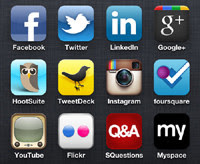Unfortunately, so far, the tweets seem pretty scripted, like this one, for example:
It shows up on several different MSSB advisors' twitter feeds, but the advisors aren't retweeting each other or talking to each other about the issue - they are just all delivering the same tweet.
Now, I'm all for companies being responsible about social media and making sure that they're in charge of the message - after all, Morgan Stanley's going to look bad if its employees are drunk-tweeting at 3:00am from Tijuana.
That said, it seems like they could benefit from a little flexibility. Maybe they want to provide the content and the link, and let the advisors come up with their own tweets?
Some of the tweets seem a little too cheerleaderish, too, like this one:
I'm glad that MSSB has a strong diversity initiative, but this kind of "I'm proud...Way to go" tweet belongs on an official corporate feed. This is more a question of style than substance. What if the tweet said something like this?
- Off to #MSSB HQ for #diversity committee work. So glad to be part of this initiative!
The tone is a little more casual, and the emotion is more genuine and personal. The more informal style also invites readers to respond. Folks might want to ask Ms. DeBellis what the committee is up to and how it operates, which is exactly what we want to happen on Twitter.
I also noticed this tweet, and some other tweets that were similar:
Again, the tone here is just too formal. This sounds scary! The whole point of Morgan Stanley being on Twitter is to make personal financial management more accessible. Mr. Ledyard could have tweeted something like this:
- Are you a trustee for a foundation or endowment? There are some guidelines you should understand. Let me know if you have questions.
The more informal tone makes Ledyard more approachable, so people are more likely to tweet or message him if they want to know more.
So what's your takeaway here?
- Make your Twitter style less formal than your press releases, whitepapers, and annual reports.
- Share emotions - what are you excited about today?
- Twitter is a place to talk to other people; keep that in mind when you write your tweets.
- If you have several feeds to represent one brand, make sure feed owners are able to customize their tweets to their own voices so you're not repeating the same tweet many times.
- Make sure your Tweeps are actually tweeting. Some of MSSB's feeds haven't been used in weeks.
What do you think of Morgan Stanley's approach? What keeps you from being more active on Twitter? Please share in the comments.
Related Posts
How to Use Twitter for Listening
Do You Need More than One Twitter






